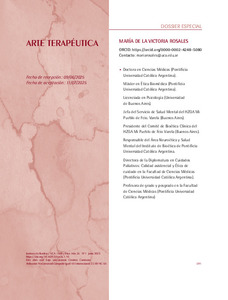Please use this identifier to cite or link to this item:
https://repositorio.uca.edu.ar/handle/123456789/20781| Título: | Arte terapéutica | Autor: | Rosales, María de la Victoria | Palabras clave: | ETICA DEL CUIDADO; CUIDADOS PALIATIVOS; VULNERABILIDAD; EMPATIA | Fecha de publicación: | 2025 | Editorial: | Pontificia Universidad Católica Argentina. Facultad de Ciencias Médicas. Instituto de Bioética | Resumen: | Este escrito rinde homenaje al Papa Francisco y a su legado bioético, centrándose en el cuidado de las personas vulnerables en las etapas finales de la vida, inspirado en la parábola del Buen Samaritano. Se analiza la carta “Samaritanus Bonus” (2020), que rechaza explícitamente la eutanasia y el suicidio asistido, promoviendo en su lugar una ética del cuidado integral. El texto enfatiza la importancia de los cuidados paliativos, que trascienden la simple curación de síntomas para abordar el bienestar físico, mental y espiritual del paciente y su entorno. Estos cuidados reafirman la dignidad intrínseca de la persona, incluso en la declinación de la vida, y se centran en aliviar el sufrimiento, entendiendo la muerte como un proceso natural. La vulnerabilidad humana se presenta como el fundamento de esta ética. Esta condición inherente al ser humano, que lo hace permeable a la interacción con otros, es la base para el arte terapéutico. La empatía es una herramienta esencial en la práctica del cuidado, ya que permite al profesional de la salud ir más allá de la enfermedad y conectar con la persona. Esta actitud humaniza la atención y se convierte en un acto de compasión que acompaña al enfermo. El artículo concluye que el deber del médico es aliviar el sufrimiento, reafirmando la vida como un bien inalienable. El acto de cuidar es un compromiso que regenera el sentido de la existencia y refleja la vocación de socorrer la fragilidad humana, incluso cuando no es posible curar. This paper pays tribute to Pope Francis and his bioethical legacy, focusing on the care of vulnerable individuals in the final stages of life, inspired by the parable of the Good Samaritan. It analyzes the Vatican letter “Samaritanus Bonus” (2020), which explicitly rejects euthanasia and assisted suicide, promoting instead a comprehensive ethics of care. The text emphasizes the importance of palliative care, which transcends the mere curing of symptoms to address the physical, mental, and spiritual well-being of the patient and their environment. This care reaffirms the person’s intrinsic dignity, even as life declines, and focuses on alleviating suffering, understanding death as a natural process. Human vulnerability is presented as the foundation of this ethics. This condition inherent to human beings, which makes them permeable to interaction with others, is the basis for therapeutic art. Empathy is an essential tool in the practice of care, as it allows the healthcare professional to go beyond the illness and connect with the person. This attitude humanizes care and becomes an act of compassion that accompanies the sick. The article concludes that a physician’s duty is to alleviate suffering, reaffirming life as an inalienable good. The act of caring is a commitment that regenerates the meaning of existence and reflects the vocation of helping human fragility, even when a cure is not possible. |
URI: | https://repositorio.uca.edu.ar/handle/123456789/20781 | ISSN: | 1515-6850 2683-6998 |
Derechos: | Atribución-NoComercial-CompartirIgual 4.0 Internacional | Fuente: | Vida y Ética. 26(1), 2025. |
| Appears in Collections: | VE - 2025 Año 26 nro. 1 |
Files in This Item:
| File | Description | Size | Format | |
|---|---|---|---|---|
| arte-terapeutica.pdf | 238,04 kB | Adobe PDF |  View/Open |
This item is licensed under a Creative Commons License

